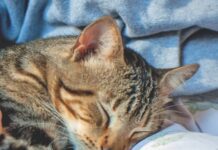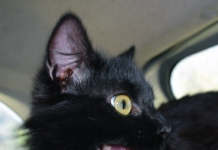Survey Finds Cats Heavier Than Ever
Obesity among pets in the U.S. continued to climb in 2012, with the number of overweight cats reaching an all-time high. Veterinarians reported that 58.3 percent of their feline patients — up from 55 percent over the previous year — were overweight or obese in the sixth annual survey by the Association for Pet Obesity Prevention (APOP). Given the cat population of 74.1 million in this country, that equals about 43.2 million cats, the association says.
Surprisingly, the survey also revealed a “fat gap,” according to APOP founder Ernie Ward, DVM. When veterinarians asked owners to describe their fat cats’ body condition as too thin, normal, overweight or obese, 45.3 percent said normal.
“The disconnect between reality and what a pet parent thinks is obese makes having a conversation with their veterinarian more challenging,” Dr. Ward says. “Many pet owners are shocked when their veterinarian informs them their pet needs to lose weight. They just don’t see it.”
Yet obesity remains the leading health threat to our nation’s pets, Dr. Ward says, adding that it’s the No. 1 preventable medical condition seen in veterinary hospitals. “The most important decision a pet owner makes each day is what they choose to feed their pet.” Health risks include type 2 diabetes, joint problems and hypertension.
The survey, conducted in October and December, gathered data from 121 veterinary clinics in 36 states and assessed 450 cats. The APOP is an organization of veterinarians and health care professionals who are unaffiliated with the veterinary industry.
Cat Food Recall Diamond
Pet Foods has voluntarily recalled certain bags of cat food because they may have low levels of thiamine, also known as vitamin B1. No complaints were received about the levels or health problems related to the products, which were distributed in 25 states, the company said.
The foods, which have specific sell-by dates and codes, include Premium Edge Finicky Adult Cat Formula, Premium Edge Senior Cat Hairball Management Formula, Premium Edge Kitten Formula, Diamond Naturals Kitten Formula and 4health All Life Stages Cat Formula.
“We have a process where we continuously test our products, and this process allowed us to find the undesired levels of thiamine in some of our cat formulas,” says Michele Evans, Ph.D., Executive Director of Food Safety and Quality Assurance at Diamond Pet Foods.
“Cats fed product with [certain] production codes and best-by dates exclusively for several weeks may be at risk for developing a thiamine deficiency,” the company says. Signs in cats can be gastrointestinal or neurological, such as incoordination, tilting of the head and seizures.
Owners seeking more information, a refund or replacement product may call the Pet Food Information Center at 888-965-6131 or visit www.petfoodinformationcenter.com.


